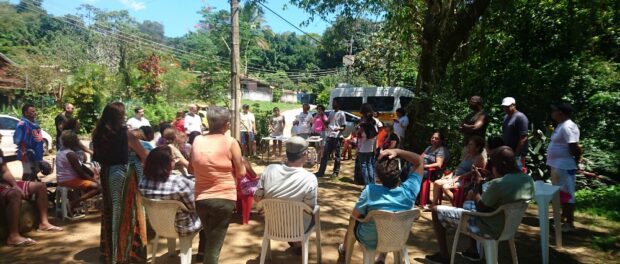
Residents of the lush and peaceful Horto favela in the South Zone neighborhood of Jardim Botânico are organizing resistance efforts in response to a decision by the Federal Court of Accounts (TCU) authorizing the Botanical Gardens to remove residents. On August 10, the TCU announced that the Botanical Gardens had 90 days to remove the historic community. While more than two thirds of the 90 day period has passed, evictions have not begun as the parties involved await results of the mayoral election to better understand whether the city will support removals. The first round of municipal elections was held on October 2, and the run-off mayoral election between Marcelo Freixo and Marcelo Crivella will be held on October 30.
Since the TCU’s decision, Horto residents, led by the Horto Neighborhood and Friends Association (AMAHOR), have organized a protest, held regular assemblies to keep residents informed and organized, and met with the current president of the Botanical Gardens Research Institute (IPJB). So far, only one resident has received an eviction notice.
On October 13, community leaders from Horto met with the current president of the IPJB, Sérgio Besserman Vianna. At the meeting, the avid bird watcher, economist and environmentalist Sérgio Besserman emphasized that in his capacity as president of the IPJB he could not support Horto’s resistance efforts, and would work to enforce the TCU’s decision. Some speculate this is because of Besserman’s relationship to Organizações Globo, Brazil’s media giant thought to be behind the eviction pressure, given his role as environmental commentator on the media monopoly’s news channel GloboNews.
At a community assembly on October 16, community leaders who attended the meeting with Besserman spoke to residents about what had happened in the meeting. According to AMAHOR’s statement published on Facebook: “He said that while the social issues had history and sensibility, as manager he defends the repossession of the area by the IPJB and as manager cannot take a position in favor of Horto remaining in this area, as it would be administrative improbity.” For Emília de Souza, former president of AMAHOR and one of those in attendance at the meeting, Besserman’s uncompromising position against Horto means that “we will have to double down on our resistance efforts.”
Ana Apolonia, an Horto resident whose home is next to current IPJB buildings, received an eviction notice on October 4. Pursuant to the notice, the removal should take place on November 6. Ana moved to Horto in 1992 when she married her husband, who passed away earlier this year. Her husband’s grandfather, Pedro Occhinoni, worked for the Botanical Gardens and constructed the house in the 1920s with permission from the institution. Again with permission from the Gardens, the family’s home was refurbished in the 1980s.
Today, the lot has three buildings, and the removal notice is for the entire lot. Ana lives in one house with her son; while there used to be five people living there, three family members have passed away in the past three years. Ana’s lot is next to the Botanical Gardens, and a wall lining one side of her lot borders the walls of research buildings on the other side. Her proximity to the existing research facilities makes her the first target for removal. However, organizers are aware, based on numerous prior cases in Rio favelas in recent years, that a single eviction can establish a precedent that undermines an entire community.
Pursuant to the August 10 TCU decision, the removal notice provides that Ana and her son will receive no compensation for their home—neither money nor a different house or apartment—despite their long history there and established rights. The eviction notice “recognizes the occupation of a public good as improper,” while residents like Ana do not even see themselves as occupiers in the first place, since they have been there for decades and with permission. On the basis of alleged improper occupation, the notice “removes the right to compensation.”
Ana and her son will not conform to the situation: “I think this is an injustice because this house is more than 100 years old and I’m harming no one by being here,” said Ana. Her son emphasized the injustice by contrasting the new August 10 TCU decision with past policies: “Until before August of this year, the proceedings for the houses, according the courts, were such that if they would remove anyone, they would compensate them… But in August of this year, they were able to reverse this decision in the courts, and now they won’t give people anything.”
AMAHOR is currently organizing to resist the evictions, offering legal assistance and registering residents in disputed areas to give them full legal support. Families living in the Vila São Jorge and Caxinguelê areas of the community have already been registered and tomorrow, Saturday October 22, families in the Margaridas and Grotão areas will be registered. Following this registration, AMAHOR will host sessions giving residents legal advice to resist the eviction process in the courts.

